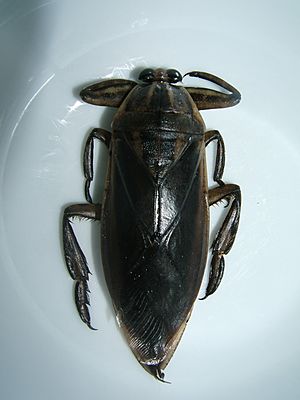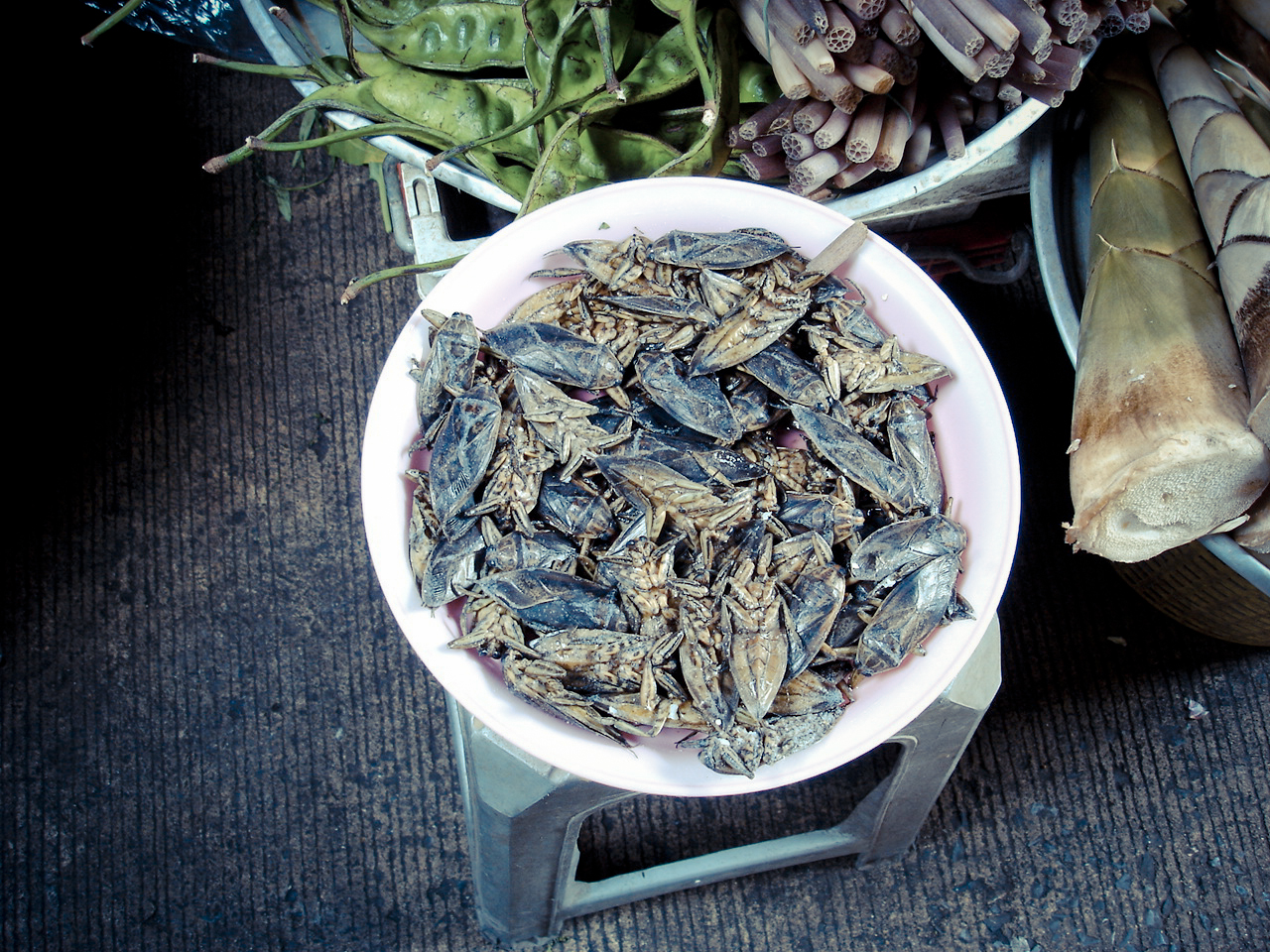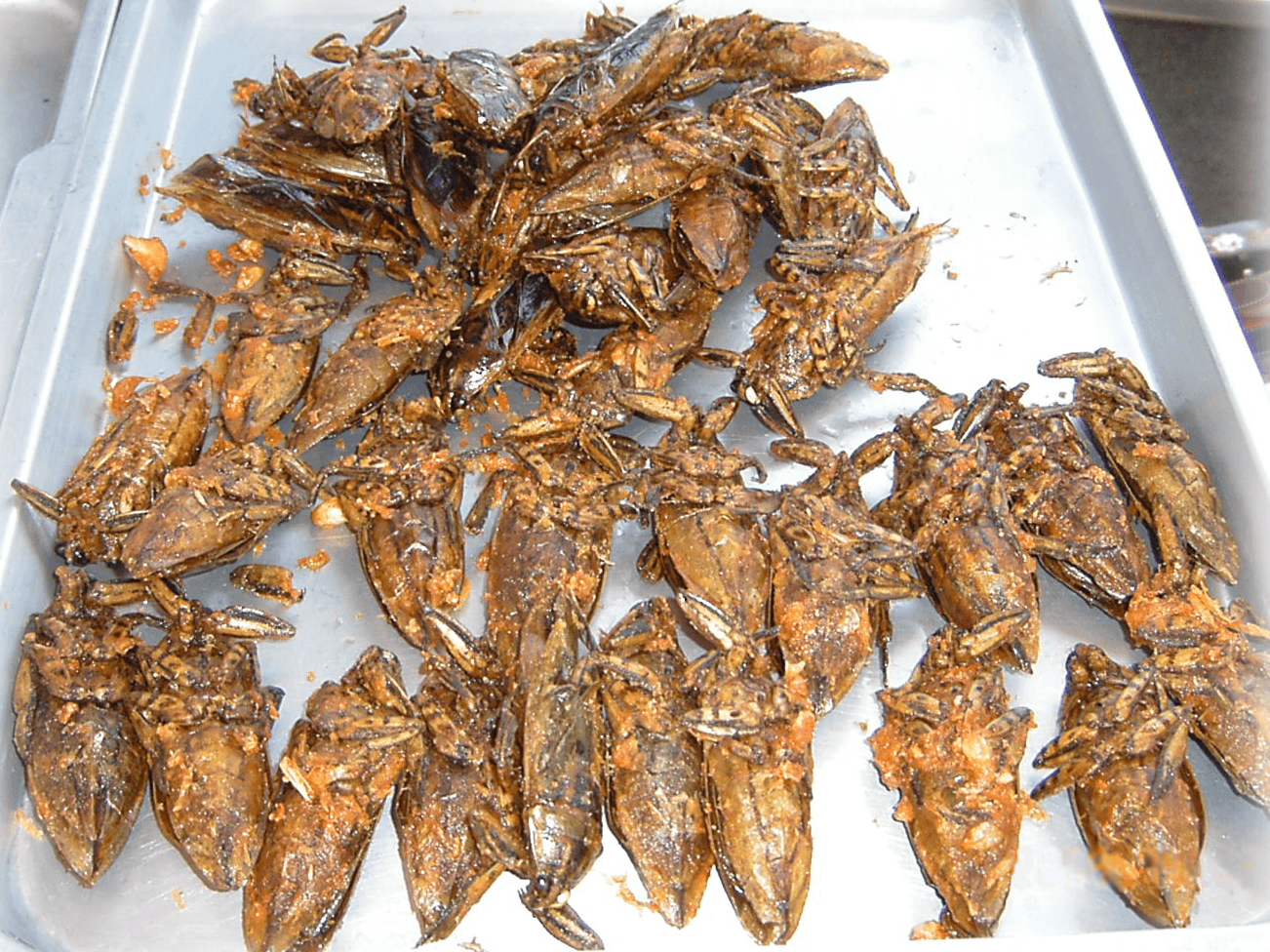Lethocerus indicus facts for kids
Quick facts for kids Lethocerus indicus |
|
|---|---|
 |
|
| Lethocerus indicus | |
| Scientific classification |
|
| Kingdom: | Animalia |
| Phylum: | Arthropoda |
| Class: | Insecta |
| Order: | Hemiptera |
| Family: | Belostomatidae |
| Genus: | Lethocerus |
| Species: |
L. indicus
|
| Binomial name | |
| Lethocerus indicus (Lepeletier & Serville, 1825)
|
|
| Script error: The function "autoWithCaption" does not exist. | |
| Synonyms | |
|
Belostoma indicum |
|
Script error: No such module "Check for conflicting parameters".
The Lethocerus indicus is a type of giant water bug. It belongs to the family Belostomatidae. This large insect lives in warm parts of South Asia and Southeast Asia. You can find it in places like China, the Ryukyu Islands, and New Guinea.
People in many Southeast Asian countries eat this insect. They often say its flight muscles taste like sweet scallops or shrimp.
Contents
About the Giant Water Bug
This water bug is quite large, usually growing between 6.5 and 8 centimeters (about 2.5 to 3 inches) long. It is one of several types of giant water bugs found in Asia.
The Lethocerus indicus lives in many places. It is found across India, Sri Lanka, and Bangladesh. Its home range also stretches into Southeast Asia, reaching east to Taiwan and south to Sumatra, Java, Indonesia, the Philippines, and parts of western Papua New Guinea.
These insects have special glands in their bodies. These glands make chemicals that have a strong smell. These smells might help male bugs attract females. Some people say the smell is like sweet bananas.
Studying the Lethocerus Indicus
Scientists find the Lethocerus indicus very interesting to study. Because it is so big, and its flight muscles are easy to look at, it's a great example for muscle research.
Its muscles are very organized, like those in your heart. This allows scientists to use special X-rays to get detailed pictures. These pictures help them learn more about how muscles are built and how they work.
As a Food Source
Eating insects is common in many parts of the world. The Lethocerus indicus is a popular food in several Southeast Asian countries.
In Vietnam
In Vietnam, this insect is called cà cuống. It is a highly valued food. Sometimes, the whole insect is boiled or fried.
The male insect produces a special liquid that attracts females. People collect this liquid, which is like a strong flavor extract. They put it into small glass bottles. Because the insect is hard to find, this extract can be very expensive. Much of the cà cuống essence sold is actually fake.
A tiny drop of the real extract is enough to flavor a whole dish. It is often used with bánh cuốn, which are rice noodle rolls. People add a drop to the dipping sauce called nước chấm. It is also used in a soup called 'bún thang'. This soup has rice noodles, egg, pork, and other ingredients in a chicken broth.
In Thailand
In the northeast part of Thailand, eating insects is very common. In other areas of Thailand, the strong-smelling essence from this insect is also popular. It is known as malaeng da (Thai: แมลงดา).
The giant water bug can be eaten whole and fried. Its extract is also used to make nam phrik malaeng Da. This is a type of chili sauce used as a condiment with meals.
In the Philippines
In the Ilocos region of the northern Philippines, eating insects is a tradition. Insects like crickets, locusts, and beetles are part of the local diet. The water bug is called alukap in the Ilokano language.
People cook it by sautéing or frying it with oil, garlic, onions, and tomatoes. Sometimes, they roast it after removing its wings and legs. It is eaten with steamed rice or as a snack with drinks. In the Visayas region, it is called obus in the Visayan language and prepared in a similar way.
 |
 |
 |
See also
 In Spanish: Lethocerus indicus para niños
In Spanish: Lethocerus indicus para niños
 | Toni Morrison |
 | Barack Obama |
 | Martin Luther King Jr. |
 | Ralph Bunche |

